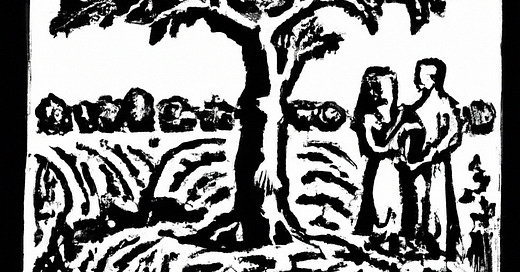Today marks the culmination of our journey exploring the complexities of temptation within the Threefold Way framework. Over the last several weeks, we've discussed the form this combat takes, how to navigate the repetitive assaults, and we’ve even speculated a bit about the fall of the angelic race. Now, we venture into the intriguing question that looms large: Why would a loving God create a world where something like moral snares even exist? Is there a deeper, transformative purpose behind the challenges and choices we face?
Early on, there was one question that just wouldn't leave me alone:
Why would God create a world with any moral snares at all? Why not place us in a Universe where we can never go wrong and only go right?
Why plant a forbidden tree?
Why let the serpent into the garden?
Why not intervene right before the fruit was plucked?
None of this seemed right. It felt like setting up a game where the deck was stacked against us.
But the more I sat with this conundrum, I slowly came to realize that my questioning was based on a flawed premise: that a life without challenges, without moral complexities, would be somehow better or more "fair."
I began to see that such a sanitized world would rob us of our freedom, our ability to choose and grow.
When I really probed these questions, I found that the world I was hoping for or imagining wouldn’t really be a world at all.
It would be a fiction.
One in which we follow a script and every danger is really no danger at all. It’s just a carefully placed plot point to keep things “interesting.” No, we’re not characters in God’s divine story. Our choices are not predetermined or meticulously planned.
We’re shockingly free.
God has gifted us with a staggering dignity, a grand nobility, the gift of freely choosing to be created. That may sound puzzling, so let me try to explain.
You were not given a choice to enter life. You were simply born. But, you are given a choice to enter into the kind of life you were designed for, the kind of life of which your current life is simply a shadow.
God waits for your consent, for your “Yes,” and mine. He waits because love invites. It doesn’t coerce, it doesn’t force. It beckons. When we give our “Yes,” it sets in motion the creation of the divine life within us. Like Mary, we’re all asked the same question: do you want to bear God in your body? Do you want Christ to grow within you?
God waits.
He waits for all of us to freely say, “Yes,” to join Mary’s chorus, “Be it unto me (Lk 1:38).” But he not only waits for our first “Yes” — he waits for a thousand yeses, and a thousand more. Because it takes all of our finite yeses, combined with God’s one infinite yes, to make Christs of us all.
This is the kind of flourishing freedom we’re gifted with.
But if we have freedom to flourish, we also have freedom to flounder, warp, and construct a contorted kind of life.
Which is the nature of any good created by God — it can have a lack, an absence, a privation. A cavity is only possible because there is a tooth, a shadow is only cast because there is light, a delusion only makes sense because there is truth. And freedom to flounder is only possible because there is freedom to flourish.
So, it’s true.
Freedom allows us to warp — to hurt and be hurt in horrifying ways, but it also allows us to cherish and be cherished, to embrace and be embraced, to care and be cared for. C.S. Lewis was right, “Free will, though it makes evil possible, is also the only thing that makes possible any love or goodness or joy worth having.”
Yes. We live in a world with moral snares, harassed and dominated by invisible enemies, but there’s a deeper truth: all of this is provisional. All of this is contained within a wider embrace of Trinitarian love, a love that’s always been and always will be, the same love we’re not only destined to inhabit, but designed to become.
And it’s this love — we can never forget — that has already achieved its decisive victory over the “principalities and powers.”
As St. Paul recognized, God “disarmed the powers and authorities, he made a public spectacle of them, triumphing over them by the cross (Col 2:15).” How did he do that, exactly?
He disarmed them not by stripping them of their warped freedom, but by letting them wield it against him
He made a spectacle of them not with his omnipotent strength, but his nonviolent submission
He triumphed over them not by slaying them, but by being slain by them
Simply put, Christ vanquishes evil by demonstrating the futility of its power with the invincibility of his own:
For love is stronger than hate – virtue more powerful than vice. Love will never lose because it never dies. It walks through death like a door, coming out more alive and lovely than it was before.
So, why did the Eternal Three create a world with the possibility of moral snares?
Because it’s the only way to create a world where the same love that flows between them, becomes the same love that flows between us. This is the only kind of world worth making, the only kind of world worth forever — this is the world of the children of God (Rom 8:21).




